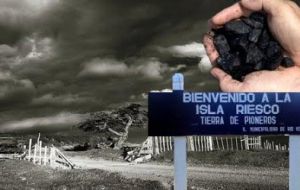MercoPress. South Atlantic News Agency
Chile approves massive coal mining project in extreme south Patagonia
 President Sebastián Piñera is one of the main shareholders behind the Minera Isla Riesco project
President Sebastián Piñera is one of the main shareholders behind the Minera Isla Riesco project The controversial Isla Riesco coal-mining project in the extreme south of Chile took another step forward last Friday when a high-level government commission gave final approval to the first of five mines, Mina Invierno.
Isla Riesco, located in far southern Chile near Punta Arenas, represents a 530 million dollars investment by the companies Copec and Ultramar to build five mines and a port. The project is expected to extract six million tons of coal each year for between 12 and 25 years. Most of the coal is expected to go towards thermoelectric power plants.
When fully operational, Isla Riesco is expected to supply 30% of Chile’s demand for coal, according to El Mercurio.
Opponents fear that mining will directly and negatively affect the local environment and that burning the relatively low-quality coal from the Isla Riesco Island will commit Chile to 25 years of “dirty energy” at a time of growing concern about climate change.
The commission, composed of the Chilean environment, health, economy, mining and agriculture ministers, voted to approve the project with several stipulations to protect the local environment.
According to El Mercurio, the company will be responsible for the planning and cost of later environmental restoration under the Mine Closure Law.
Other stipulations require the company to monitor pollution from the mine and to minimize the effect of the mine on local flora and fauna, such as the endangered huemul, one of Chile’s two national animals. In addition, the company is prohibited from depleting a nearby lagoon until a study determines the possible impact on local birds.
According to Minister of the Environment María Ignacia Benítez, chair of the commission, the Superintendent of the Environment will be monitoring Isla Riesco in order to make sure that the company complies with the stipulations.
But for some these measures are not enough. “What the government has done is green-light the destruction of a natural habitat, unique in the world, where vulnerable species like the huemul, the puma and the condor live,” opposition politician Dep. Carolina Goic told local media.
Dep. Enrique Accorsi, another opposition member, said the approval of Mina Invierno demonstrates the need to reform the environmental approval system. “Our evaluation system is imperfect, because 99.9 percent of the submitted projects are approved,” Accorsi told El Mercurio
The council of ministers’ ruling confirmed a February decision by local authorities (all appointed by Santiago) to approve the project. However, neither ruling tackles the broader problem of coal-based energy.
Sara Larraín, director of environmental NGO Chile Sustenable, told local media, “Isla Riesco supports Chile’s tendency towards coal, which would mean a 360% increase in carbon emissions”.
Coal burning power plants produce more carbon dioxide than alternatives like hydroelectricity or natural gas. Still, 59% of power generation currently under construction in Chile is coal-based, according to figures from the National Energy Commission (CNE). Chile is already the third largest CO2 emissions polluter (per capita) in South America.
On the political front, members of the opposition Concertaciòn coalition allege that Minera Isla Riesco is yet another example of a conflict of interest for billionaire businessman, Chilean President Sebastián Piñera.
President Piñera holds almost 800,000 shares of stock in Copec, making him one of the largest investors in one of the two companies behind the Minera Isla Riesco project.
Although the stock is held in a blind trust for the duration of his presidency, Dep. Accorsi explained that after Mina Invierno was approved by the environmental authority in February the stock price of Copec rose, earning a 5 million dollars profit for the President.
Chile’s Comptroller General rejected accusations of a conflict of interest in Friday’s council decision. According to La Tercera, opponents plan to appeal the council decision to Chile’s Supreme Court.
By Benjamin Schneider – The Santiago Times





Top Comments
Disclaimer & comment rules-

-

-

Read all commentsSomething must be told about the coal based energy production in Chile. First, along the 20 years leftist Gvt. were approved 67 thermal plant for energy production, the most coal based....Second, Chile has a very low gas reserves but a high coal reserves, so it means replacemnet of imports, jobs and incomes for the locals.....Third, from the 19th century we have been extracting coal very, very near to the new project, without enviromental damages as the main mine (Pecket) is side by side with the biggest penguin site and big sheep farms....Fourth, The huemul deer lives very far from the mine site, on the high mountains at the western extreme of the island, were the polution will not arrive due the predominant winds in the area, as well as the wales lives near to the Carlos III island were the polution will not arrive (from Pecket never has been a problem and this project hadn´t an enviromental study because on those times when it started it weren´t required). The condor and the puma lives all around the Chilean Patagonia, and the area to be afected is a small part of it.....Fifth, the enviromental requirements for the approval ask a restitution of the mine sites to the nearest to the original condition, so the the matter is the acomplshing of the Mine Closure Law....and sixth and final, the enviromental fundamentalist Sara larrain has never been on the future mine site so she is not allowed to speak for us, the inhabitants of the Chilean Patagonia´s Region of Magallanes and Chilean Antarctica. We are the who can decide if the project is good or not for us......nobody living in the poluted capital city far away from us....We, the most of the Magallanes inhabitants, are very happy with the start of the project in a very near future, so well done Gvt....!!! At last you´r working for us....!!!!
Aug 16th, 2011 - 07:02 pm 0Good comments, Sergio,
Aug 17th, 2011 - 03:47 pm 0but my guess is that the coal enterprise is more environmentally damaging than a hydroelectric scheme.
My vote goes for the 'no/low carbon' scheme,
but I know human nature will drive Chileans to the 'high carbon/high sulphur, polluting ' option.
Good to see jobs & wealth coming to southern Chile.
Aug 18th, 2011 - 09:22 am 0Commenting for this story is now closed.
If you have a Facebook account, become a fan and comment on our Facebook Page!